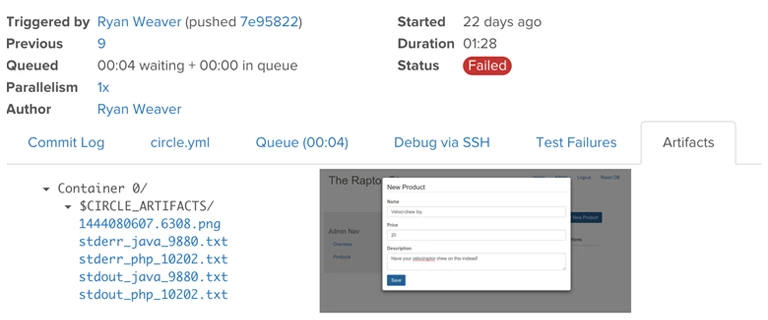Behat on CircleCI with Failure Screenshots

Tip
tl;dr By combining Behat and CircleCI, you can automatically take screenshots on failures and see a list of them on each build. This is madness!
Tip
This blog post was updated to support CircleCI 2.0 because CircleCI 1.0 will no longer be available after August 31, 2018.
For KnpUniversity, we use both Behat and CircleCI for continuous integration. The combination works great, except for debugging. If you've done functional testing in a CI environment before, then you're probably familiar with (yikes!) phantom failures: those tests that only seem to fail on the CI server, making them nearly impossible to debug.
I don't like to lose time debugging tests. And thanks to Behat and CircleCI, you
can easily take screenshots of the browser at the moment of those failures and see
them on the build afterwards. Now, when you forget to install wkhtmltopdf on your
CI server, you'll see a big error screenshot that tells you so. Sweet!
CircleCI Setup
To run our @javascript Behat scenarios, we use Selenium 2. Our CircleCI 2.0 config.yml setup
(without the screenshot magic) looks like this:
# .circleci/config.yml
version: 2
jobs:
build:
docker:
- image: php:7
- image: mysql:5
environment:
MYSQL_ALLOW_EMPTY_PASSWORD: yes
- image: selenium/standalone-chrome:3
working_directory: ~/your-repository-name
steps:
- checkout
# Update Composer and install dependencies
- run: composer self-update
- run: composer install --prefer-dist
# Setup database
- run: php bin/console doctrine:database:create --env=test
- run: php bin/console doctrine:schema:create --env=test
- run:
name: Run web server
command: php bin/console server:run --env=test -vvv localhost:8080 > server.log 2>&1:
background: true
# Run tests
- run: php vendor/bin/behat
# and maybe some unit testsCircleCI 2.0 allows you to add Docker images, so you don't need to take care of a lot of
details that we previously
needed to worry about, like setting up xvfb and installing a browser (Chrome).
The behat.yml file doesn't need anything special, except that the web server port
needs to match the 8080 used above and you should use the chrome browser:
default:
# ...
extensions:
Behat\MinkExtension:
base_url: http://localhost:8080
goutte: ~
selenium2: ~
browser_name: chrome
Behat\Symfony2Extension: ~That's it for CircleCI setup.
Taking Screenshots on Failure
Next, we need to take a screenshot each time a scenario fails. Behat does most of
the work for you. Just add this to your FeatureContext:
// FeatureContext.php
use Behat\Behat\Hook\Scope\AfterStepScope;
use Behat\Mink\Driver\Selenium2Driver;
use Behat\MinkExtension\Context\RawMinkContext
// ...
class FeatureContext extends RawMinkContext
{
/**
* @AfterStep
*/
public function printLastResponseOnError(AfterStepScope $event)
{
if (!$event->getTestResult()->isPassed()) {
$this->saveDebugScreenshot();
}
}
/**
* @Then /^save screenshot$/
*/
public function saveDebugScreenshot()
{
$driver = $this->getSession()->getDriver();
if (!$driver instanceof Selenium2Driver) {
return;
}
if (!getenv('BEHAT_SCREENSHOTS')) {
return;
}
$filename = microtime(true).'.png';
$path = $this->getContainer()
->getParameter('kernel.root_dir').'/../behat_screenshots';
if (!file_exists($path)) {
mkdir($path);
}
$this->saveScreenshot($filename, $path);
}
}This uses the @AfterStep hook
to save a timestamped screenshot into a behat_screenshots/ directory on failure.
The saveScreenshot() method comes directly from the RawMinkContext class that's
available from MinkExtension.
Tip
With a little more work, you could probably use the AfterStepScope object to save
a screenshot that's derived from the scenario's name.
It also only does this if it sees a BEHAT_SCREENSHOTS environmental variable:
I don't need screenshots when I'm working locally.
To finish things, we need to tweak the CircleCI setup to make sure this directory
exists and to set the BEHAT_SCREENSHOTS environment variable that activates everything:
# .circleci/config.yml
version: 2
jobs:
build:
# ...
steps:
# ...
# Run tests
- run: mkdir var/behat_screenshots/
# add an empty file so that the directory isn't empty (else copy may fail)
- run: touch var/behat_screenshots/empty.txt
- run:
name: Run Behat tests
command: php vendor/bin/behat
# Export environment variable for this single command shell
environment:
BEHAT_SCREENSHOTS: '1'
# and maybe some unit tests
- store_artifacts:
path: var/behat_screenshots/The store_artifacts command is special to CircleCI 2.0: it uploads a file or a directory so
that, when the job finishes, you can view those files in the Artifacts tab of the Job page in
your browser. There is no limit on the number of store_artifacts steps a job can run. Artifacts
will be available after the job finishes.
To become a Behat & Mink expert, check out our full BDD, Behat, Mink and other Wonderful Things tutorial.
Have fun!
4 Comments
Hey Brain,
Take a look at my PR here: https://github.com/knpunive... - I updated this blog post to support CircleCI 2.0. Feel free to leave some comments if you find any problems.
Cheers!

Excellent package for capturing fails https://github.com/forceedg...